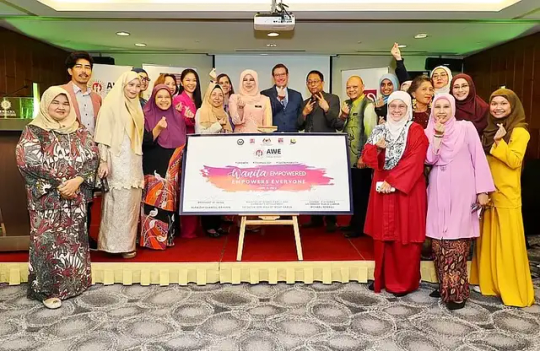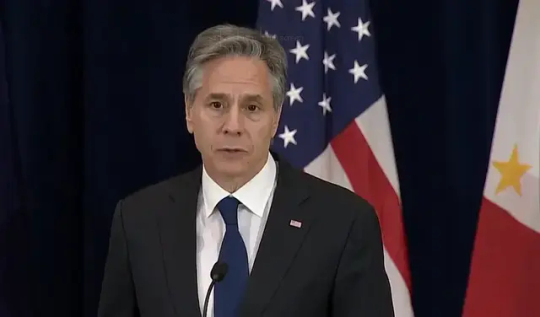#U.S.StateDepartmentInitiative
Text
Empowering Entrepreneurs: U.S. State Department's Summit Triumph

Groundbreaking Academy for Women Entrepreneurs (AWE) Summit
The U.S. Department of State made a historic announcement, unveiling the first-ever Academy for Women Entrepreneurs (AWE) Indo-Pacific Women-in-Tech Summit. The event, held in Taipei from November 13-16, brought together 75 women entrepreneurs from Brunei, India, Malaysia, New Zealand, Philippines, Singapore, Taiwan, Thailand, and Vietnam.
As a vital initiative under the United States' broader mission to enhance economic opportunity, equity, and societal inclusion, AWE aspires to equip women entrepreneurs globally with knowledge, networks, and international access, fostering the growth of successful businesses.
Empowering Women Entrepreneurs Across the Region
Hosted by the American Institute in Taiwan and with substantial support from Taiwan’s Small and Medium Enterprise and Startup Administration under the Ministry of Economic Affairs, the AWE Indo-Pacific Women-in-Tech Summit was a testament to collaborative efforts.
Facilitated through a partnership between the State Department and Advancing Women in Tech (AWIT), a 501(c)(3) non-profit dedicated to propelling more women into technical leadership roles, the summit featured two distinguished experts through the U.S. Speaker Program.
Shanti Punukollo, board member of AWIT and former product leader at Amazon and Microsoft, and Holly Liu, co-founder of Kabam and managing partner of PKO Investments, delivered inspiring remarks and engaged participants in lively discussions, enhancing the overall summit experience.
Global Economic Empowerment Exchange Program
The Academy for Women Entrepreneurs (AWE) stands as a transformative global economic empowerment exchange program initiated by the U.S. Department of State. In collaboration with Arizona State University’s Thunderbird School of Global Management and the Freeport-McMoRan Foundation, AWE operates in over 100 countries and economies worldwide.
Demonstrating an impressive track record, engaging approximately 25,000 women entrepreneurs, AWE provides invaluable support. This aid plays a pivotal role in assisting women on their journey to unlock their full economic potential.
Sources: THX News & US Department of State.
Read the full article
#AcademyforWomenEntrepreneurs(AWE)#AdvancingWomeninTech(AWIT)#AWEGlobalEconomicEmpowerment#HollyLiuSummitEngagement#Indo-PacificWomenEntrepreneursEmpowerment#ShantiPunukolloKeynoteSpeaker#U.S.SpeakerProgramHighlights#U.S.StateDepartmentInitiative#Women-in-TechSummitTaipei#Women-ledBusinessesExpansion
0 notes
Text
Blinken's Remarks at SCSP’s Global Emerging Tech Summit

Exact transcript from the Speech
SECRETARY BLINKEN: Hello, everyone, and thank you for the opportunity to join the Special Competitive Studies Project’s Global Emerging Tech Summit.
Two years ago, I spoke at the National Security Commission on AI Summit about the critical role that diplomacy can play in shaping the terms of our technological future. The United States has made clear our intention to compete for our vision of that future – one in which emerging technologies are developed and deployed in ways that deliver for our people, that protect our interests, that uphold our values.
Since then, even in two short years, the technological landscape has transformed. Today, generative AI is now fully part of our lives, and has entered the bloodstream of our public debate. Other critical and foundational technologies, from quantum to synthetic biology to 6G, are rapidly advancing, and in some cases converging, to increase the potential for even further game-changing breakthroughs.
And as emerging technologies stand poised to revolutionize the production of knowledge, rewire our economies, rearrange the building blocks of life itself, they’re also challenging the global competitive landscape.
The United States must play a pivotal role in determining how these technologies are developed and how they’re used for years and decades to come.
The State Department is leading diplomatic efforts to do exactly that so that we can lead the world into this new era of technology safely, securely, and with trust.
Broadly, our tech diplomacy has five interconnected lines of effort.
First, we’re advancing our vision for the technological future. We believe technology can and must be used to put countries on the path to prosperity, solve shared global challenges, and build a better tomorrow for all. To build support for that vision, we’re working with likeminded partners to demonstrate to the world how our approach tangibly benefits them and how it contrasts with the repressive vision of other states.
Second, we’re shaping the rules of the road. We’re working with developed and developing countries alike to promote our principles for using and governing emerging technologies. In AI, that includes the approaches contained in the Blueprint for an AI Bill of Rights, and the voluntary commitments from leading AI companies recently released by the White House. We’re also building a broad-based international consensus around a Political Declaration on Responsible Military Use of AI and Autonomy.
We’re advocating for these approaches not because they’re ours, but because they are technically rigorous, advance human rights and democratic values, and will help usher in benefits for all.
Third, we’re promoting trusted digital infrastructure. We want countries to continue to adopt digital infrastructure – wireless networks, cloud, undersea cables – that are secure, reliable, and interoperable, and that allow for greater protection against human rights abuse, privacy violations, and threats to national security and global stability. We’re partnering with the U.S. private sector – and that of our allies – to preserve and strengthen our positions where we possess technological advantages.
Fourth, we’re rewiring tech ecosystems, including supply chains. We’re working with other states – including through coalitions and initiatives like the Quad and the U.S.-EU Trade and Technology Council – to align our industrial policies in a way that guards against global disruptions to critical technologies. Private companies and capital are also key to these efforts.
Fifth, we’re applying a “small yard, high fence” approach to sensitive technologies. We’ll continue working with our partners to build a shared understanding of the threats from these technologies falling into the hands of human rights abusers or being used to advance the military capabilities of strategic competitors. We’ll take all necessary steps to prevent U.S. technologies being used in ways that will harm our people, our interests, or our values.
These goals are as ambitious as they are important, and they depend on a modern and strong State Department that’s ready and empowered to meet the opportunities and challenges of this moment.
That’s why, over the last two years, we’ve elevated and strengthened our cyber, digital, and tech diplomacy. We established the Bureau of Cyberspace and Digital Policy and the Office of the Envoy for Critical and Emerging Technology to focus and direct our diplomatic efforts. We’re recruiting, training, promoting, and working to retain more tech-proficient professionals across the department.
But we can’t do this work alone. We need partners like the Special Competitive Studies Project to help advance our nation’s tech leadership. Just as the Rockefeller Special Studies Project of the 1950s, led by Dr. Kissinger, convened leading minds to shape our strategic approach to the early post-war period, SCSP is helping the U.S. Government sharpen our thinking, clarify our national purpose, and compete over the long term.
As the original Special Studies Project found, “A nation which does not shape events through its own sense of purpose eventually will be engulfed in events shaped by others.”
Together, we have the ability to bring about a tech future that’s inclusive, rights-affirming, secure, and prosperous. If we’re successful, we will strengthen our nation’s position as the center of global innovation, boost our resilience and that of our partners, ensure our competitiveness for years to come, and demonstrate the ability of democracies to deliver in this new technological era.
Thanks for your remarkable work and for your partnership. And thanks for the opportunity to speak with you today.
Sources: THX News & US Department of State.
Read the full article
#Digitalinfrastructuresecurity#Diplomacyandemergingtechnologies#Futureoftechnologydiplomacy#Globaltechleadership#Internationaltechgovernance#Sensitivetechnologycontrol#Shapingtechnologicalfuture#Techdiplomacy#Techecosystemsandsupplychains#U.S.StateDepartmentinitiatives
0 notes